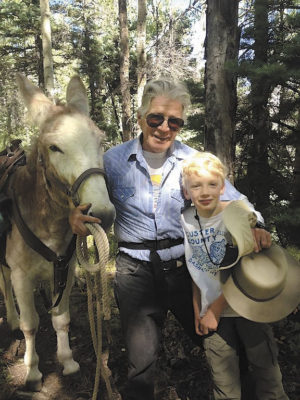 By Andria Williams
By Andria Williams
Random House, ISBN-13: 9780812987423
Hardcover, $27 384pp
Reviewed by Annie Dawid
The debut novel by Colorado Springs author Andria Williams explores in white-knuckled prose the meltdown at a nuclear reactor in Idaho Falls, Idaho, on January 3, 1961. This particular disaster, resulting in the deaths of three young military operators, receded into history, subsumed by the larger nightmare at Pennsylvania’s Three Mile Island plant 18 years later, in which no lives were lost, and now, by the 2011 Fukushima Daiichi fiasco.
Williams teases out the story of the SL-1 accident within the context of the bildungsroman of Nat Collier, a very young Army wife, and her husband, Paul, both of whom will acquire wisdom, wounds and possible radiation damage in the course of their exposure to readers, from 1959 to 1961. A third protagonist, Jeannie, wife of Master Sergeant Richards, who is Paul’s boss and a negligent if not malignant force, adds the outsider’s view to the couple’s at times fractious marital life.
The Longest Night explores the culture of military life in general and the strictures for the military wife in particular during the late 1950s. The novel’s epigraph comes from the 1954 edition of The Army Officer’s Guide: “There can be no greater admiration than that of the husband … to return and find, as he had hoped, that his own wife has met the test of keeping up her end of things.”
What follows is Nat’s valiant attempt to do just that – sometimes successfully, often imperfectly as she attempts to raise two young daughters and becomes pregnant with another child during the couple’s fraught two-year stint in Idaho. Nat grew up on the beaches of San Diego, where she cultivated a freedom-loving existence – not grounded, with no particular direction – which comes to a close at 19 when she meets Paul, an intense military man from Maine. These opposites find a sort of completion in one another, and fulfill a familial love not offered by the parents of either. They marry quickly, launching themselves and their fast arriving progeny into a world of rigorous routine.
While Nat is no feminist, she nurtures an independent spirit which comes alive in water – the ocean of her youth replaced in the novel by the cold waters of the reservoir outside Idaho Springs. In the first section from Nat’s point of view, we find her unable to resist diving in from the rocks, still clad in her dress, against her husband’s wishes. “The sheer, pure cold sucked the air from her body and she surfaced, stifling a scream. Then she burst into laughter, paddling back toward her family. She hadn’t done something like that in years. How could anyone not love this sensation? It slapped you in the face and shouted You’re alive!”
Her spontaneous gesture, applauded by strangers, infuriates Paul. “What if you dove down and hit something and never came up, right here in front of your little girls?” He refuses to speak to her for the rest of the day.
[InContentAdTwo] Deftly, Williams charts the clashing trajectories of these two very different young marrieds in an era of serious conformity. Paul’s conservatism serves him well in his career, working with the most dangerous energy source of our time, though his serious understanding of nuclear power is not shared by all. His daughters get their feet x-rayed every time they go to the shoe store, a common practice in the 1950s, despite the radiation damage still killing civilians in post-war Hiroshima and Nagasaki.
Small-town gossip wreaks another kind of havoc in the lives of Nat, Jeannie and other Army wives. Alcoholism pervades the on- and off-base communities of the military men and sometimes their wives as well. We witness uncomfortable interactions between Army personnel and Idaho’s Mormon citizens as well as the Native American women who exist on the outskirts of town and respectability. In one horrific scene, Master Sergeant Richards calls one of them “Squawnik,” a term he thinks cute and innovative.
Readers can watch the nuclear disaster zooming toward us, as Williams previews it in the novel’s opening pages, then returns us two years earlier, to the couple’s arrival in Idaho. Even with that foreknowledge, we remain uncomfortably enthralled as the laissez-faire policies at the plant run by the often drunk Master Sergeant lead inexorably to another kind of Ground Zero.




